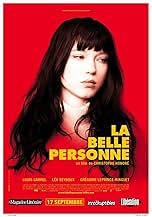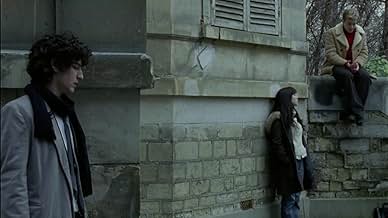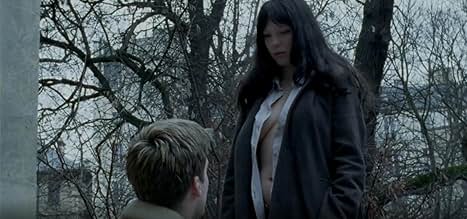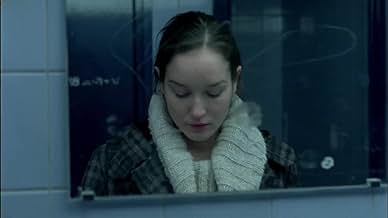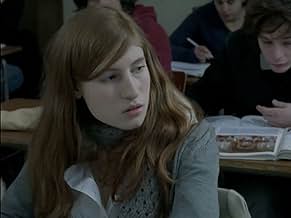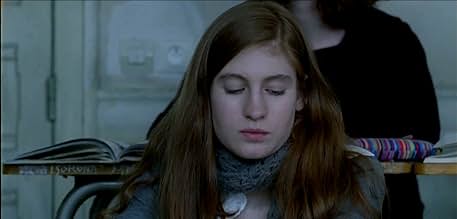La belle personne
- 2008
- Tous publics
- 1h 30m
IMDb RATING
6.6/10
8.4K
YOUR RATING
Cute Junie starts at her cousin Matthias' high school and class after her mom's death. She meets his friends. The boys want to date her - even her handsome, young Italian teacher.Cute Junie starts at her cousin Matthias' high school and class after her mom's death. She meets his friends. The boys want to date her - even her handsome, young Italian teacher.Cute Junie starts at her cousin Matthias' high school and class after her mom's death. She meets his friends. The boys want to date her - even her handsome, young Italian teacher.
- Director
- Writers
- Stars
- Awards
- 2 wins & 4 nominations total
- Director
- Writers
- All cast & crew
- Production, box office & more at IMDbPro
Featured reviews
After her mother's death, a pretty teenage girl (Lea Seydoux) moves in with relatives and attends school with her male cousin. She quickly gets embroiled in the dizzying affairs of her cousin's clique of friends and young teachers. There are straight affairs, gay affairs, straight love triangles, gay love triangles, bisexual love triangles, teacher-student affairs, teacher-student love triangles--really you need some kind of chart to keep track of it all. "Junie", the protagonist, first gets involved with "Otto", the shy odd-man-out in all these sexual shenanigans (perhaps because he's the only one with a decent haircut), but she soon finds herself drawn to the young Italian teacher (Louis Garrel), who is already involved with another student in the clique AND a fellow teacher.
This kind of sounds like a French bedroom farce--especially a scene where one character drops a lurid love letter from his pocket and everyone thinks it belongs to the Italian teacher, leading to all kinds of misunderstandings. But this movie is actually very moody and gloomy--even tragic at one point. All these liaisons don't seem to leave anyone very happy. In that respect this kind of reminded me of Catherine Breillat film, but it also has a surprising lack of sex scenes (aside from one strange scene where Seydoux bares her breasts for her boyfriend in what looks to be a school hallway or the streets of Paris). It is also strangely anachronistic. It's a modern-day film judging from the occasional use of cell phones, but the characters still pass notes instead of text messaging. And I guess it must be perfectly legal in France for teachers to carry on with students because no one even remarks on it. (Of course, everyone here LOOKS like they're in their twenties). I guess France is just a different place--at least their movies certainly are.
Seydoux is pretty good here even if her character is frustratingly opaque. She and Anais Demoustier (who has a small part in this and would appear with Seydoux again later in a similar film called "Le Belle Epine") might be the only girls prettier than their male co-star Louis Garrel, who has appeared in seemingly every other French film since making his mark in Catherine Breillat's 2007 film "The Last Mistress". It is Seydoux though who is perhaps on the verge of true international fame with a starring role in "Farewell, My Queen" and in the upcoming Cannes-winner "Blue is the Warmest Color". This is kind of strange movie for a lot of reasons, but it's also actually pretty good.
This kind of sounds like a French bedroom farce--especially a scene where one character drops a lurid love letter from his pocket and everyone thinks it belongs to the Italian teacher, leading to all kinds of misunderstandings. But this movie is actually very moody and gloomy--even tragic at one point. All these liaisons don't seem to leave anyone very happy. In that respect this kind of reminded me of Catherine Breillat film, but it also has a surprising lack of sex scenes (aside from one strange scene where Seydoux bares her breasts for her boyfriend in what looks to be a school hallway or the streets of Paris). It is also strangely anachronistic. It's a modern-day film judging from the occasional use of cell phones, but the characters still pass notes instead of text messaging. And I guess it must be perfectly legal in France for teachers to carry on with students because no one even remarks on it. (Of course, everyone here LOOKS like they're in their twenties). I guess France is just a different place--at least their movies certainly are.
Seydoux is pretty good here even if her character is frustratingly opaque. She and Anais Demoustier (who has a small part in this and would appear with Seydoux again later in a similar film called "Le Belle Epine") might be the only girls prettier than their male co-star Louis Garrel, who has appeared in seemingly every other French film since making his mark in Catherine Breillat's 2007 film "The Last Mistress". It is Seydoux though who is perhaps on the verge of true international fame with a starring role in "Farewell, My Queen" and in the upcoming Cannes-winner "Blue is the Warmest Color". This is kind of strange movie for a lot of reasons, but it's also actually pretty good.
This is a lovely, deliberate, melancholy look into the fairy-tale lives of pale, beautiful, preternaturally graceful high-school students in Paris - a dreamy, pearly, wintry Paris on which the harsh sun never, ever shines.
The Beautiful Person is so hypnotically beautiful that it drew me through the somewhat jarring adjustment I had to make from my placid late-middle-aged American world into theirs, which teems with sex and longing, but - Oh, my! - it was worth it. This movie is luxurious and delightful.
Some of those who do not like it may be unwilling or unable to make such a cultural adjustment, but those who do will be rewarded. Earlier reviews here encouraged me to hang in there through the rough patches in the beginning, when I could not even tell who was who and doing what with whom. Those reviews also hinted that I might be slightly disappointed after Christophe Honoré's last movie, the remarkable Love Songs (Les Chansons d'amour). I was not at all. This is a sadder movie, but it is no less deeply satisfying.
Like Love Songs, seeing this once is not enough: I need my own copy so I can watch it over and over. Also like Love Songs, I expect the pleasure it gives will grow richer with each viewing.
Something nice I just realized: there are no drugs in this movie, hardly any alcohol (none at all among the kids), no vomiting, no farting, no bullying, no mindless cruelty or grossness of any kind. In other words: This is not an American movie for American teenagers. It is probably not even a realistic view of Parisian teenagers (even they must have a few pimples), but realistic or not it is a joy to behold.
The Beautiful Person is so hypnotically beautiful that it drew me through the somewhat jarring adjustment I had to make from my placid late-middle-aged American world into theirs, which teems with sex and longing, but - Oh, my! - it was worth it. This movie is luxurious and delightful.
Some of those who do not like it may be unwilling or unable to make such a cultural adjustment, but those who do will be rewarded. Earlier reviews here encouraged me to hang in there through the rough patches in the beginning, when I could not even tell who was who and doing what with whom. Those reviews also hinted that I might be slightly disappointed after Christophe Honoré's last movie, the remarkable Love Songs (Les Chansons d'amour). I was not at all. This is a sadder movie, but it is no less deeply satisfying.
Like Love Songs, seeing this once is not enough: I need my own copy so I can watch it over and over. Also like Love Songs, I expect the pleasure it gives will grow richer with each viewing.
Something nice I just realized: there are no drugs in this movie, hardly any alcohol (none at all among the kids), no vomiting, no farting, no bullying, no mindless cruelty or grossness of any kind. In other words: This is not an American movie for American teenagers. It is probably not even a realistic view of Parisian teenagers (even they must have a few pimples), but realistic or not it is a joy to behold.
When I first encountered this film upon arriving in France in 2008, my grasp of French was tenuous at best. Recommended by a date as an initiation into the intricacies of Parisian life and French identity, I absorbed its essence more through its visual tapestry than its dialogue. Nevertheless, its exploration of youth, love, loss, and tragedy struck a chord, despite a notably contrived poetry scene.
Years later, fluent in French and revisiting the film, I appreciated its cultural references and recognized every Parisian locale. Yet, while its emotional and sexual tensions remained compelling, its narrative seemed less relevant to my current stage of life. The adaptation of La Princesse de Clèves, while timely in its original context, no longer resonated with the depth it once did during my youth.
However, the film's strength lies in its nostalgic depiction of a bygone Paris, albeit one that may appear overly romanticized and out of step with contemporary cinematic depictions. Nevertheless, Paris continues to attract visitors seeking its nostalgic allure, and the film serves as a testament to the enduring appeal of recreating this enchanting past.
While somewhat overlooked, this film merits attention, particularly for those yet to experience its evocative portrayal of Parisian life.
Years later, fluent in French and revisiting the film, I appreciated its cultural references and recognized every Parisian locale. Yet, while its emotional and sexual tensions remained compelling, its narrative seemed less relevant to my current stage of life. The adaptation of La Princesse de Clèves, while timely in its original context, no longer resonated with the depth it once did during my youth.
However, the film's strength lies in its nostalgic depiction of a bygone Paris, albeit one that may appear overly romanticized and out of step with contemporary cinematic depictions. Nevertheless, Paris continues to attract visitors seeking its nostalgic allure, and the film serves as a testament to the enduring appeal of recreating this enchanting past.
While somewhat overlooked, this film merits attention, particularly for those yet to experience its evocative portrayal of Parisian life.
Sadly on this site we get mostly American reviewers, and the fact that this film is set in an enclosed world and not one of an ' ordinary school ' seems to elude them. Christophe Honore, in this one of his most perfect films took on a brave task and that is in treating Madame de La Fayette's equally perfect ' Princesse de Cleves ' into a story relevant to the 21st C. I believe his achievement works brilliantly. and his setting of a classroom for a 17th C. Court. He quite rightly makes this a place where letters replace emails, and I for one adjusted to this immediately. The hermetic universe of passions, intrigue and tragedy is given more focus by not being ' real ' in the sense that a modern French classroom most certainly is. This is his genius in achieving total involvement by concentrating on the conflict of emotions, and also giving both heterosexual and homosexual desires and sentiments equal status. I am not sure what Madame de La Fayette would have thought of that, but although unspoken in her world it must have been part of it. The acting was superb, and the casting to me as right as the concept. It saddens me that the education in the Anglo-Saxon world is not as in touch with Classical literature and Philosophy as it is still in French schools and that to my knowledge this masterpiece is not available on DVD in the UK. It is a loss among so many losses as we move further and further away from mainland Europe and a true understanding of a film as great as this.
I was expecting an intriguing and cool movie having kind of read the plot on wikipedia and having seen the lead actors (which I really like), but sadly I thought the movie was rather inconsistent, the temporal cuts were awful, the love between them was poorly depicted and acting was not so special. Overall I think it's an okay movie if you are watching it whilst doing something else (cause plot's not so thick) or if you want to take your mind off of things.
Did you know
- TriviaChristophe Honoré decided to make this adaptation of La Princesse de Clèves after French president Nicholas Sarkozy criticized the novel.
- ConnectionsFeatured in Clash: Olivia: Hymen (2012)
- SoundtracksWay To Blue
Written and Performed by Nick Drake
Copyright Warlock Music Ltd administered by Kobalt Music Publishing Ltd.
- How long is The Beautiful Person?Powered by Alexa
Details
- Release date
- Country of origin
- Official site
- Languages
- Also known as
- The Beautiful Person
- Filming locations
- Production companies
- See more company credits at IMDbPro
Box office
- Gross worldwide
- $748,217
Contribute to this page
Suggest an edit or add missing content

![Watch Bande-annonce [OV]](https://m.media-amazon.com/images/M/MV5BNjgzNWM4MTAtY2Q3ZS00MjliLTlmZTctY2M3NmM2ODUzOWRkXkEyXkFqcGdeQXRyYW5zY29kZS13b3JrZmxvdw@@._V1_QL75_UX500_CR0)


